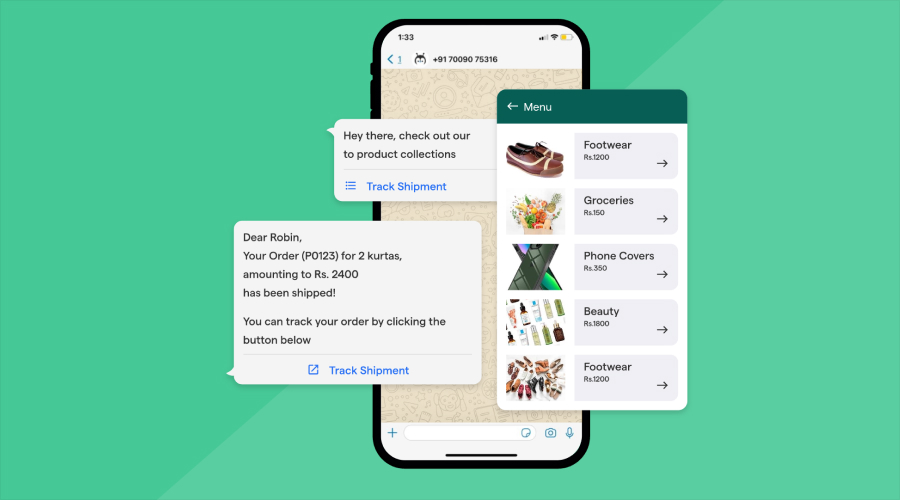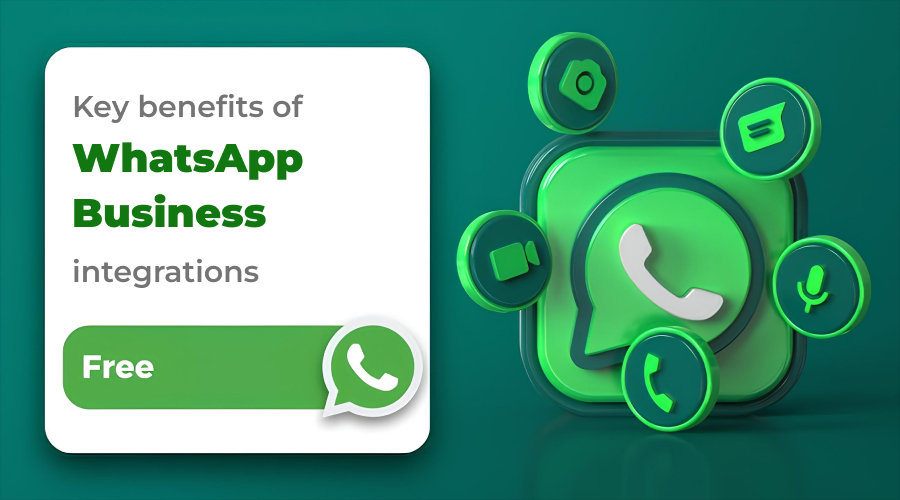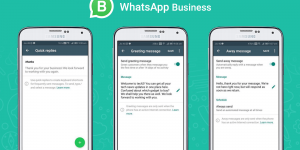
In an era where instant communication defines customer expectations, businesses are increasingly turning to messaging platforms to enhance their customer support capabilities. Among these, WhatsApp Business stands out as a global leader, with more than 2.95 billion monthly active users in 2025 and a staggering 98% message open rate.
This article explores the transformative potential of WhatsApp Business and its customer support integrations, and delves into how these tools empower businesses to deliver seamless, efficient, and personalized customer experiences. Packed with expert insights, data, and real-world examples, we’ll reveal why integrating WhatsApp Business with customer support systems is a game-changer for modern businesses.
Why WhatsApp Business is a Customer Support Powerhouse

Launched in 2018, WhatsApp Business was designed to bridge the gap between businesses and their customers, providing tools to automate, sort, and respond to messages at scale. With more than 200 million monthly active business users as of July 2023, it has become a cornerstone for businesses looking to meet customers where they are.
The anchor of this revolution is WhatsApp Business and Customer Support Integrations, which enable companies to streamline communications, leverage automation, and integrate with existing systems such as CRMs and help desk platforms.
These integrations allow businesses to provide 24/7 support, personalize interactions, and increase operational efficiency while leveraging WhatsApp’s unparalleled reach across 180 countries and 60 languages.
The platform’s appeal lies in its simplicity and effectiveness. Unlike traditional channels such as email (with a 20% open rate) or SMS, WhatsApp messages have a 45-60% click-through rate, making it a preferred channel for both businesses and consumers.
In addition, 83% of consumers use messaging apps like WhatsApp to research products, and 75% make purchases after engaging through these platforms. This high level of engagement is driven by WhatsApp’s ability to provide real-time, conversational support, which 54% of users prefer for customer service inquiries and order updates.
The role of the WhatsApp Business API in customer support
At the heart of WhatsApp Business’ scalability is its API, which allows larger businesses to integrate the platform into their existing customer support ecosystems. Unlike the free WhatsApp Business app, which is designed for small businesses, the API caters to organizations that need advanced tools to manage high-volume interactions.
For example, platforms like AiSensy, Zendesk, and Trengo allow businesses to connect WhatsApp to CRMs, help desks, and marketing tools to centralize communications and automate workflows.
The WhatsApp Business API supports features such as
- Automated Notifications: Businesses can send order confirmations, delivery updates, and payment reminders, with 45-60% of abandoned carts recovered through targeted WhatsApp campaigns.
- Chatbot Integration: By 2025, WhatsApp chatbots are expected to save businesses 2.6 billion hours per year, handling 67% of customer queries without human intervention.
- Multimedia Messaging: Organizations can share images, videos, and PDFs, with 65% of API users using multimedia for marketing and support.
- Multi-agent support: Multiple team members can manage chats on a single WhatsApp number, with intelligent routing based on tags and campaigns.
A real-world example comes from PhysicsWallah, an Indian edtech company that used AiSensy’s WhatsApp integration to increase customer engagement from 35% to 90% through smart retargeting and personalized chatbot flows. Similarly, Turkish fashion brand Modanisa resolved 70% of customer queries through WhatsApp chatbots, reducing call center costs by 36%.
Key benefits of WhatsApp Business integrations

Integrating WhatsApp Business with customer support systems unlocks a number of benefits backed by compelling statistics:
1. Increased customer satisfaction: Businesses using WhatsApp Business report a 225% faster response time, leading to a 27% increase in sales and a 20% improvement in conversion rates. A YouGov survey found that 33% of users value WhatsApp’s fast responses, while 28% appreciate after-hours interaction.
2. Cost Efficiency: WhatsApp chatbots reduce customer service costs by up to 40%, with financial services brands achieving 5x lower acquisition costs compared to other digital channels.
3. Personalization at scale: 72% of consumers engage with personalized WhatsApp messages, and 69% are more likely to buy from brands that offer a WhatsApp option. Integrations with CRMs like Zoho or Salesforce allow businesses to tailor messages based on customer data, resulting in a 300% ROI for brands like Concrete Jungle.
4. Global Reach: With 2.5 billion users and dominance in markets such as India (535.8 million users) and Brazil, WhatsApp is an essential channel for businesses targeting mobile-first economies.
5. High engagement: WhatsApp’s 98% open rate and 57% conversion rate dwarf email’s 23% open rate and 10% conversion rate, making it a superior channel for customer engagement.
These benefits are amplified by integrations that centralize communications. For example, Zendesk’s WhatsApp integration allows agents to manage chats alongside email and social media tickets, using AI agents trained on billions of CX interactions to deliver instant, accurate responses.
Real-World Applications and Case Studies
WhatsApp Business integrations are transforming industries, from e-commerce to healthcare. Here are some notable examples:
- E-commerce: Indian snack brand Omay used WhatsApp to personalize shopping experiences, resulting in a 5x increase in inquiries compared to email. WhatsApp’s product catalogs, viewed by 40 million users monthly, enable seamless browsing and purchasing within the app.
- Financial Services: A financial brand reported 20,000 new insurance inquiries per month via WhatsApp, with a 35% reduction in call center costs and an 82 NPS score.
- Healthcare: 30% of healthcare providers use WhatsApp for appointment scheduling and reminders, improving patient engagement and reducing no-shows.
- Travel: 55% of travel agencies leverage WhatsApp for booking confirmations and customer support, enhancing traveler satisfaction.
- Public Sector: During the COVID-19 pandemic, the World Health Organization used WhatsApp chatbots to disseminate health information, while Australia’s government operated a dedicated WhatsApp channel.
These cases highlight WhatsApp’s versatility, made possible by integrations that enable automation, analytics, and multi-channel support.
Challenges and best practices

While WhatsApp Business integrations offer immense potential, organizations must overcome challenges to maximize their impact:
- Compliance: Adherence to WhatsApp’s policies and privacy regulations is critical. End-to-end encryption ensures secure communications, but businesses must obtain user consent for marketing messages.
- Scalability: High message volumes require robust integrations. Platforms such as AiSensy and Trengo offer real-time analytics and intelligent routing to manage large-scale interactions.
- User Experience: 73% of users abandon brands due to slow responses, and 56% cancel purchases when queries go unanswered. Chatbots and AI agents mitigate this by providing immediate responses.
To be successful, companies should follow these best practices:
- Personalize messages: Use customer data to create tailored responses, as 68% of users find WhatsApp the most convenient way to connect with brands.
- Leverage AI: Deploy AI agents to handle routine queries, freeing up human agents for more complex issues.
- Seamless integration: Connect WhatsApp to existing systems to ensure a single customer view across channels.
- Monitor Analytics: Track read, reply, and click-through rates to optimize campaigns with AiSensy’s real-time dashboards.
- Test Chatbot Flows: Build conversational journeys that feel natural, with smooth handoffs to human agents when needed.
The future of WhatsApp business integrations
As WhatsApp continues to evolve, its role in customer support will continue to grow. Meta, WhatsApp’s parent company, is introducing features like “click-to-WhatsApp” ads and in-chat booking capabilities that will further integrate the platform into the customer journey. By 2025, global spending on WhatsApp Business is expected to reach $3.6 billion, up from $38.7 million in 2019, reflecting its growing importance.
Emerging trends include:
- AI-powered support: AI agents will handle more complex queries, with Zendesk reporting that pre-trained bots can accurately answer questions from day one.
- E-commerce integration: WhatsApp’s catalog and payment features will drive in-app purchases, with 65% of shoppers willing to buy from businesses they can message.
- Regional Expansion: Asia Pacific, with 800 million WhatsApp Business users, will continue to be a key growth driver, particularly in India and Indonesia.
Bottom Line
WhatsApp Business and its customer support integrations are redefining how businesses engage with their customers. With a 98% open rate, 2.95 billion users, and powerful tools like the WhatsApp Business API, the platform offers unparalleled opportunities for personalization, automation, and efficiency. Integrations with platforms like Zendesk, AiSensy, and Trengo enable businesses to centralize communications, leverage AI, and deliver exceptional experiences at scale. From e-commerce to healthcare, real-world cases demonstrate WhatsApp’s ability to increase revenue, reduce costs, and improve satisfaction.
As businesses face rising customer expectations, adopting WhatsApp Business integrations is no longer optional – it’s a strategic necessity. By meeting customers on their preferred platform, businesses can build trust, drive conversions, and stay ahead of the competition. For those ready to transform their customer support, now is the time to integrate WhatsApp Business.






